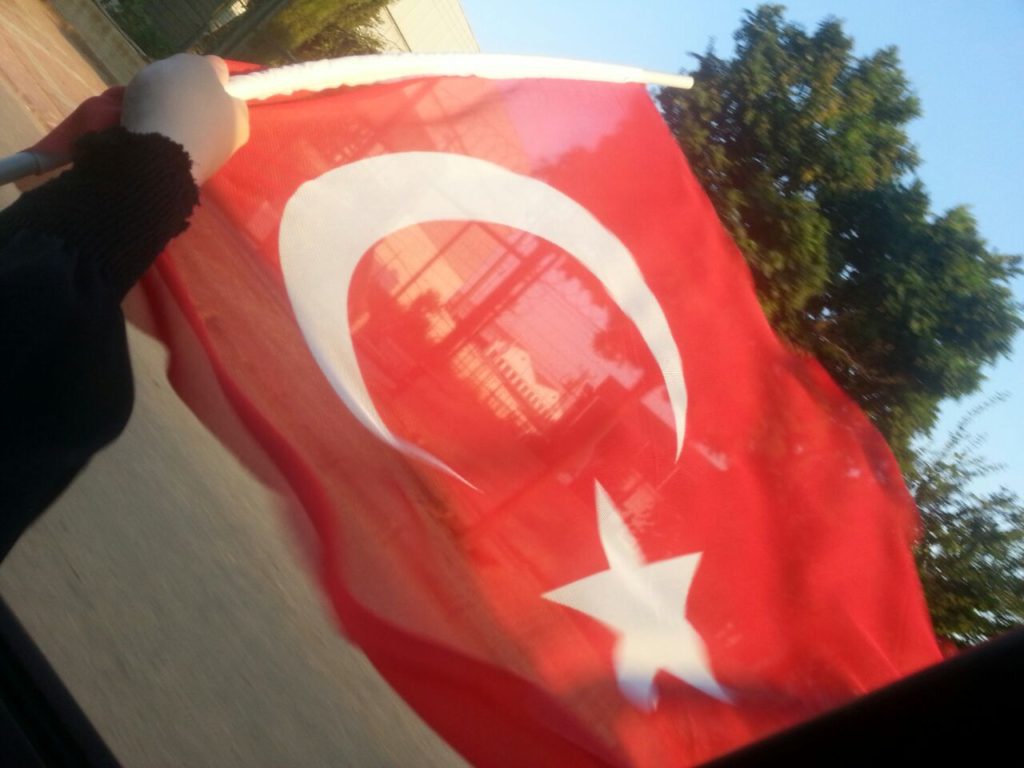Turkish Women’s Rights Struggle During State of Emergency

By Lubunya - Own work, CC BY-SA 4.0, https://commons.wikimedia.org/w/index.php?curid=50205595

A week ago the Turkish president, Recep Tayyip Erdogan, began a referendum campaign to support a bill that could transform the country’s parliamentary system into a presidential one, which could keep Erdogan in office until 2029. The possibility of a stronger presidency with Erdogan at its head could augur a challenging path for activism in Turkey. Women’s rights groups say their work has become even more difficult since the July coup attempt, with organizations divided by politics and critics facing an even harder fight for women’s issues.
The working relationship between women’s groups and the ruling Justice and Development Party (AKP) once held the promise of reform, but this deteriorated over the past five years. The extension of the state of emergency after the attempted coup on July 15, only added to the sense that women’s rights initiatives will continue to be ignored.
In November, the AKP proposed a measure in Parliament that quickly became known as the “Rape Law,” because it would allow rapists who marry their victims to receive lighter prison sentences. Its introduction caused an uproar both inside and outside the country, even from one of the founding members of Prime Minister Binali Yildirim’s AKP. Due to the vocal pushback, the AKP withdrew the proposal, and Yildirim promised to take criticisms into consideration before proposing a new bill.
Unfortunately, this level of government response to Turkey’s dozens of women’s rights groups is a rarity under the current administration. Activists fear that long-pending legislation aimed at furthering women’s rights will continue to languish unenforced, and that any new initiatives will be stillborn. There is also sharp disagreement among women’s groups themselves, with some supporting the AKP government and others deeply opposed.
Memories of Reform
Women’s rights organizations and activists are struggling to work with the AKP in Turkey after years of difficult, yet arguably successful, collaboration.
In the early 2000s, when the AKP first came to power, it had a reformist bent, including women and minority issues on its agenda. During these years, women’s rights activists won an important victory with the 2004 reform of the Turkish Penal Code. The changes included higher sentences for sexual crimes, the criminalization of sexual harassment, and the removal of graduated sentences for rape depending on the woman’s virginity.
Sehnaz Kiymaz, a board member of the Turkish group, Women for Women’s Human Rights – New Ways, remembers working with the AKP on changing the penal code. According to Kiymaz, “32 of the [changes]that we proposed were accepted. This includes marital rape, which is missing from some of the western legislation.”
Kiymaz tied the government’s decision to improve women’s rights to its previous attempts to join the European Union (EU). As its interest in joining the EU cooled, she said, the AKP became less interested in working with truly reform-minded women’s groups.
Kiymaz pointed to numerous cases when judges used loopholes in the law to give lighter sentences to men convicted of murdering and raping women, as well as domestic violence, more generally. As she observed, “The political climate in Turkey has deteriorated in terms of the rhetoric on gender equality and rights. Currently, we are trying to hold ground with the legislative articles we have.”
Unenforced legislation
Linda Fraim, a psychologist who taught courses on domestic violence and sexuality at the conservative Fatih University in Istanbul, spoke on the ongoing problems with implementing existing women’s rights legislation in Turkey. For example, in 2005, the AKP supported a Protection of the Family Bill that required municipalities of over 500,000 residents to open a shelter for survivors of domestic violence. Municipalities are falling drastically short of providing the recommended number of shelters, despite a clear need. Research published by Haceteppe University in 2014 found that close to four out of every ten Turkish women experience violence at the hands of their male partners.
Where shelters are created, as per the legislation, they do not go far enough in protecting women. “Everyone knows where the shelters are. You see the perpetrators walking along the street.” Said Fraim, “The police don’t do anything.”
Fraim views the “woman issue” as a convenient way for the current government to change the agenda, describing the AKP government as “all talk, no action.”
Post-coup divisions
After the coup attempt, many women’s organizations posted anti-coup statements on their websites. KADEM, or the Women and Democracy Association which is known for sympathizing with the government, actively defended the AKP after the coup attempt, Zeynap Yapar, KADEM’s external relations assistant, said in an email exchange that the group took part in promoting the “democracy watches” supported by the government. The democracy watches involved large gatherings in public squares, meant to show support for the AKP government.
Yapar described KADEM’s post-coup efforts, which included organizing a Women and Justice Summit with the Ministry of Family and Social Policies: “We started a civil movement where we called people to put henna on their palms while attending the democracy meeting on seventh of August as a sign of our determination to safeguard democracy at all costs.” KADEM organized a second summit that focused on women and peacebuilding, as well as a panel series on the political repercussions of the coup attempt for women, and society-at-large.
Summeye Balci, a family psychologist at a government-run center for women and children in Istanbul’s Zeytinburnu municipality, works directly with women in need and is also sympathetic to the AKP. She listed a number of government programs that are helping Turkish women, like the state’s employment agency, IsKur, which has provided financing to over 6,500 female entrepreneurs, in coordination with the European Union and the European Bank for Reconstruction and Development.
For critics of the government, however, there is little possibility of meaningful cooperation or compromise on women’s issues with the AKP. Sevna Somuncuoglu, general director of The Turkish Women’s Union, which works to increase women’s political rights and bring greater social equality, described the AKP government as more open to working with women’s groups in its earlier years. Somuncuoglu’s organization works to implement a program in Istanbul on eliminating violence against women, but she doubts it will be able to launch after the coup attempt due to lack of funding and fear of new restrictions on political organizing.
The government and has closed a number of NGOs through decrees allowed by the state of emergency, including women’s organizations. Women’s groups that are critical of the government are also worried that they may be soon targeted for retaliation. In the past, the AKP government used tax audits to punish their political enemies, like Dogan Media and Koc Holding. Somuncuoglu said, “They are always using these audits. We are expecting an audit.”
Somuncuoglu believes the AKP now prefers to work with what she calls “GONGOs,” non-governmental organizations that are, in fact, organized by the government to further its own political interests. The GONGOs may use the language of activism, but stay clear of challenging the government’s agenda. According to Somuncuoglu, there is little government funding available to independent women’s groups these days, which has created another hurdle for these organizations. While the government has created more grants for women’s rights groups in the last few years, Somuncuoglu says they mostly go to groups supportive of, or created by, the government. The Turkish Women’s Union, for example, survives on EU grants alone.
Kirmizi Semsiye works to protect the health and rights of sex workers, male and female. Project Manager Ozge Gokpinar fears the worst for post-coup Turkey: “We are expecting a strict, more conservative and more controlling governmental form, which will provide no room for NGOs.”
Activists looking to push reforms have less freedom after the coup attempt. Turkey’s current state of emergency laws allow for 30 days of pre-charge detention, the first five days of which detainees may not be permitted to meet with a lawyer. In addition to facilitating the closure of women’s organizations, arresting activists, and attacking opposition media, government decrees cannot be challenged in court until the state of emergency ends.
Still, Kiymaz says, “Turkey has always been a country where there were strict gender roles, but we have struggled against it.” Even as critics face increased pressure from the AKP government, Kiymaz is focused on activism.
Clare Busch is a Master’s student in both Journalism and Near Eastern Studies at New York University. She spent three years living in Turkey where she worked for various new outlets. Her areas of interest are religious movements, minorities, and women’s rights in Turkey.




